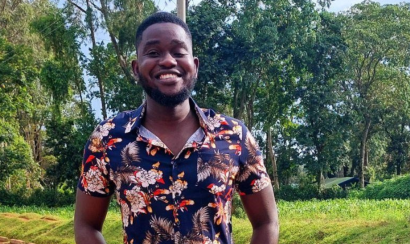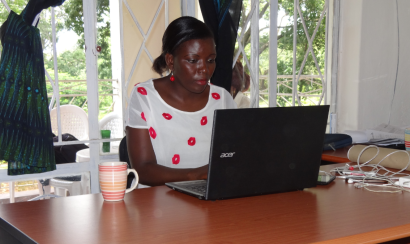What It’s Like to Manage a 1,000-Person Team

Since 2006, One Acre Fund has grown into a leading agricultural resource for farmers in Eastern and Southern Africa: we are now working with more than 1 million smallholder farmers in ten countries. At the heart of this work is our field team: the 6,000 local leaders who work directly with farmers year-round to improve their harvests.
So for Leonce Ngaboyakema, who leads the execution of field operations across Rwanda, managing a 1,000-person field team is all in a day’s work. Each week, his team fans out across the country in a synchronized effort to provide customer service and training to more than 380,000 farmers.
We sat down with Leonce to talk about his job and interest in agricultural development.

First of all, what does it mean to be the execution lead?
Execution covers our entire field operations -- everything from farmer enrollment to repayment, to systems like organizing subsidy lists and pickups from the warehouses. For my job, it’s very important to understand the situation in the field and communicate with the strategy team. So for example, for enrollment, our strategy team puts together a plan for the season that explains how much we want to grow and why we should do certain things. Then I pick up their numbers, and divide them out into the steps we need to take to enroll, such as whether we’re going to advertise or increase marketing efforts in another way.
In Rwanda, we also have to deliver services to farmers in two overlapping seasons, unlike in most of our country operations where farmers grow crops over one long season. This adds extra complexity to our execution. It means we need to keep our training sessions as simple as possible and make sure that our field teams have the right toolkits to work under these unique conditions.
How do you handle managing such a large staff?
It’s been a unique opportunity to be in the execution lead role. Most of the time it doesn’t feel like I oversee 1,000 people. I directly manage two senior field directors, and under them is a whole team of staff, which consists of field directors, assistant field directors, field managers, and field officers who work directly with farmers on training, enrollment, repayment, and other activities.
The job is exciting because there’s always something happening, or something to deal with. It never gets boring. You get to learn the basics of everything we do that impacts farmers, and understand the complexity of putting together a strategy to reach so many people. The most important things to remember when managing such a big team are: communication simplicity and clarity. For information to filter through from my position to the last person in the chain, it needs to be simple and as clear as possible. That is the only way to ensure that the team is delivering to meet everyone’s expectations.

What brought you to your position? What has your career path been like?
Previously I was on the operations innovations team at One Acre Fund. That was a little more radical. We were constantly looking five years down the road and studying things like mobile money, market access, cooperatives, and exploring different channels and delivery mechanisms. There were plenty of opportunities to scope my own projects, propose new things to leadership, and in the end have the license to move forward. That was a new experience for me. I was never able to do something like that in my old jobs, prior to One Acre Fund. It was almost like being an entrepreneur who doesn’t use his own money.
Before I started working at One Acre Fund, I had a few other jobs in different parts of Rwanda in agribusiness and development. I worked in quality assurance for a coffee company, and then I was a plant manager for a farmers’ cooperative that processed fruit into juices and jams and sold them into markets in Kigali. I also worked for the International Organization for Migration on a project helping refugees resettle in Rwanda and other countries.
Did you always have an interest in agriculture?
I was born into an agricultural family. My father was in agribusiness, and my mother was in banking, but she also had some fields that she took care of. Our family business was a milk collection center, where my father would buy milk from other people and sell it to retailers. I worked there for a while after high school, and that’s where my interest in agriculture was enhanced.
You’ve got a big job with a lot of different responsibilities. What keeps you motivated and excited about the work?
The biggest driver for me is that I am a patriot. My country is basically an agriculture-based economy, so working in agriculture is my way to contribute and help Rwanda develop. Agriculture is something that touches people’s lives. You can see the changes in families when you visit them during the harvest, the effect it has on their lives. I could probably work for a bank and make arguably more money, but would it be as interesting? I don’t think so. Also, making a difference at a large scale really matters to me. That’s why I like One Acre Fund, because we reach so many farmers at the same time.



